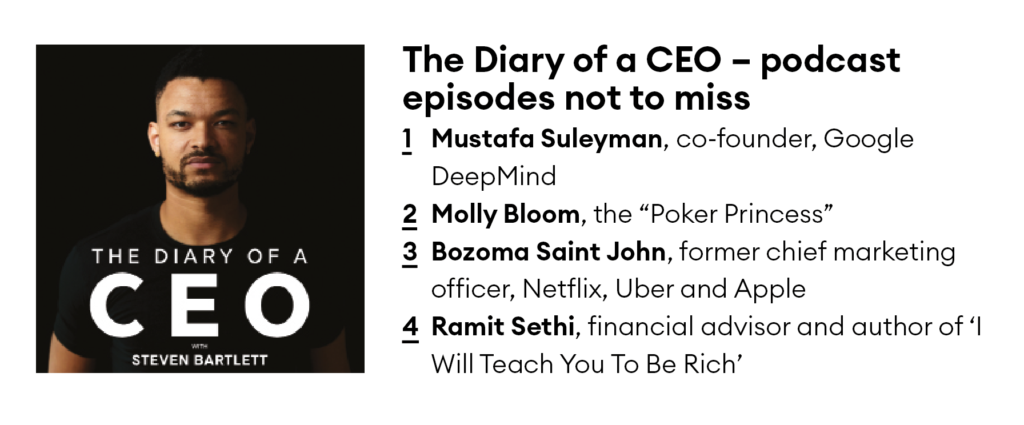A 31-year-old millionaire entrepreneur shares his 33 laws for leading in the next 100 years.
Steven Bartlett’s story is the stuff of legend. From a teenager with a laptop in Manchester, UK, who shoplifted to eat, he became the founder and chief executive of one of the world’s most successful digital marketing agencies, Social Chain: a company he founded at 22-years-old and took public just five years later. Bartlett is also a notable investor, adviser to big-name brands like Uber, Apple and Amazon, and host of top podcast, ‘The Diary of a CEO’. It was the 700 hours of this podcast that inspired Bartlett’s latest project, the similarly titled book, The Diary of a CEO: The 33 Laws of Business and Life.
Many ‘lessons’ books are compendiums of clippings from different leaders, compiled by typically older, white business-people narrating a legacy. The fact that Bartlett’s book is named after the podcast may be good for search engine optimization, but it rather creates the expectation that it will be another such compendium of disparate recounted insights from other people; “So-and-so said this to me in episode 54.” But I am delighted to report that this book is different; unlike the podcast that shares the expertise of others, the book’s core insights come from Bartlett’s own observations and learnings.
The four pillars
Four pillars, 33 lessons, 368 pages. Many numbers, many models; the structure of this book is complicated. Bartlett has drawn 33 lessons from his experience, research and interviews with podcast guests and organized them into four pillars: the self, the story, the philosophy and the team. It is a structure that makes the book easy to consult with specific questions – but tough to know where to start. (Even worse, the audiobook lacks pillar titles or headings to help readers navigate the content.)
However, prospective readers shouldn’t be discouraged. Bartlett brings sharp vision, clear thinking and an appreciation of history, experience and human nature to the book, and they help make sure that his 33 laws are relatable, digestible and actionable. His voice is authentic, and his beliefs are backed up with evidence, including cited neuroscientific research (which this reviewer – a former neuroscientist – found most appealing).
Leading in times of innovation
What truly sets this book apart is that it is written with the aim that the “laws” could guide leaders over the next 100 years. In this way, Bartlett attempts to be more like Roman emperor Marcus Aurelius than Nike chief executive Phil Knight. He largely succeeds.
For example, Bartlett focuses on ways to sell ideas that people don’t yet understand (start by finding a shared perspective), and how to identify the next valuable technological innovation (if it scares influential people in the field, it’s going to be big).
One particularly impactful example of a lesson that will stand the test of time comes in a story in the book’s first pillar. Bartlett recalls the first time he, at 19 years old, pitched his social media agency to an unnamed fashion house back in 2012. “I was berated, mocked and dismissed. The marketing director I was pitching to was visibly terrified… He ended the meeting midway through my presentation, and needless to say, he never called me back.” The fashion house declared bankruptcy a few years later, and Bartlett learned his fifth law: you must lean in to bizarre behavior. You must risk the ordinary to be extraordinary.
As Bartlett argues, his tools and laws will become even more important as innovation cycles accelerate in the coming years.
Frank and reflective
Bartlett’s written voice echoes his on-air appearances: no-nonsense and frank. He is the mentor who will chastise you for weaknesses and drive you to build your strengths. In an anecdote early in the book, Bartlett acerbically recalls a 21-year-old employee leaving his company to take a senior-level job (“I didn’t believe him,” says the author) and failing miserably in it. This attitude is not for everyone, but readers of this book are probably already hooked on Bartlett’s content, and are used to it.
If Bartlett’s frankness is evident, so is his earnestness: the reader truly feels that the author wants them to succeed and that there is plenty of brilliance to go around. It is this facet of selflessness that draws the reader in. “Steven says” has become a common phrase among the young London entrepreneur set. There is little condescension here, and the lack of sugar-coating adds a clarity that will appeal to the most driven and ambitious readers.
Could the book have instead been 33 social media posts or a podcast sub-series? Yes. Readers can achieve the same effect by listening to the audiobook on the commute, absorbing lessons as bite-size meditations on becoming a CEO of the future – which ardent readers of the The Diary of a CEO are likely to be.
Kirsten Levermore is deputy editor of Dialogue.


